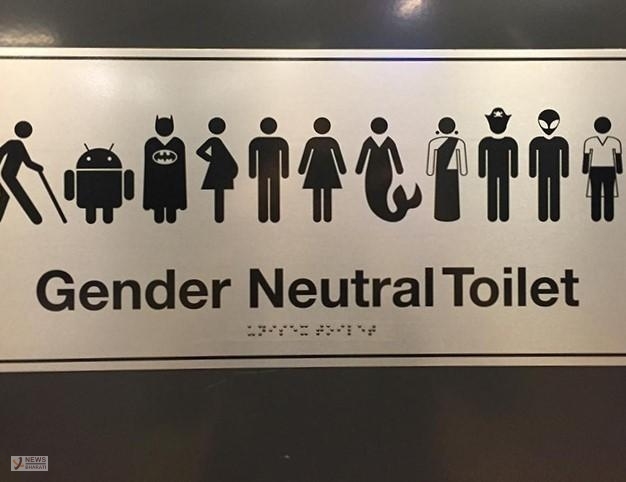Gender Neutral toilets, new 'Loo'nacy? | Wokeism#13
The USA can be said to be the pioneer of gender-neutral toilets which began functioning at universities and public schools. In December 2021, the Chicago Public Schools (CPA), made it mandatory for all public schools to make toilets gender-neutral.
Total Views |
Gender-neutral toilets or unisex toilets are quite a recent phenomenon that may be traced back to the start of the 21st century. Our previous articles have discussed how cultural Marxism and its offshoots have interfered and have started deconstructing/destroying the established cultural and social beliefs. The offshoot called Queer Theory says that there aren’t two genders and that one’s gender identity depends on how one feels. One can feel feminine at dawn and masculine at dusk. Hence, gender is fluid. The rejection of gender binary also meant the rejection of toilets meant for these gender binaries. So the queer revolution finally struck the separate toilets meant for two biologically separate genders.

The USA can be said to be the pioneer of gender-neutral toilets which began functioning at universities and public schools. In December 2021, the Chicago Public Schools (CPA), made it mandatory for all public schools to make toilets gender-neutral. The administrative authorities hailed this decision as a ‘big step towards gender equity for students and staff’. This means that kids from kindergarten to 12th grade will use the same toilets. ‘Bathroom Bill’ is one of the most debated topics in the USA currently. The Bathroom Bill is legislation that may include or exclude transgender persons from accessing public toilets based on the assumed gender. Countries like Canada, the United Kingdom, China, Japan, Thailand, etc. are known to have gender-neutral toilets in public spaces, universities, and corporate offices.
What is happening in India regarding this issue? Let’s take a look. In March 2022, NALSAR, a public law school in Hyderabad announced that it has introduced gender-neutral washrooms in its campus to make the campus a ‘truly inclusive space’. This news came after the National Council of Educational Research & Training (NCERT) in its training manual for teachers ‘Inclusion of Transgender Children in School Education: Concerns and Roadmap’ had included the concept of gender-neutral toilets in schools. This manual was taken down after a complaint was filed by an individual to the National Commission for the Protection of Child Rights (NCPCR). The NCPCR in its letter to NCERT stated that the approach taken in the manual would expose the children to unnecessary psychological trauma as they would face contradictory environments at home and in school. The said manual also recommended the use of harmful puberty blockers (discussed in our earlier article on gender-affirming surgeries) for students. In 2017, The Ministry of Drinking Water and Sanitation issued guidelines to the Swachh Bharat Gramin Mission and all the states affirming that the transgender community should be allowed to use the public toilets of the gender they wish to. We had earlier said that transgender in India and transgender in the West is altogether different issue. Hence the above guideline was a welcome step for the much-neglected transgender community of India. The Supreme Court of India has also issued a directive for separate toilets for transgender people in public spaces including hospitals.
Also Read: What is Body Positivity?| Wokeism#11
The upholders of gender-neutral toilets claim that these toilets signify diversity, unity, and inclusion for all genders (100 plus genders in the Woke world). These toilets also help to tackle transgender issues in the Woke world. But the data and the increasing resistance to using these toilets tell a different story. In the UK, data obtained through a Freedom of Information request says that unisex toilets are more dangerous for women and girls than separate toilets. About 90 percent of complaints regarding changing room sexual assaults, voyeurism, and harassment are about incidents in unisex facilities. In 2021, girls in Scottish secondary schools refused to use gender-neutral toilets owing to boys' misbehavior and vandalism. Male students have been spotted "waving sanitary goods like flags" and urinating in sanitary bins. There have also been reports about rampant drug abuse in these gender-neutral toilets. In March 2023, a 13-year-old girl was attacked by a boy in the gender-neutral toilet in their school in Coventry UK. Kerry School in Ireland scrapped the idea of constructing gender-neutral toilets after vehement opposition from the parents.
Gender-neutral toilets disregard the safety and privacy of an individual, particularly women. These toilets apparently, also go against the ideals of Feminism when ‘Toxic Masculinity’ or ‘Patriarchy’ or simply ‘Toxic Men’ are given a free pass to invade the privacy of women. Historically, women have fought against the lack of access to public toilets. This is as old as the 1850s when women in the UK had to compulsorily stay home due to the lack of public toilets for women. In India, it is a shame that crores of toilets were constructed under the Swachh Bharat Abhiyaan even after 70 years of independence. Till then, women and girls had to go out in the open to answer nature’s call. There have also been reports of sexual assaults on women who had gone out in the open to the toilet. Many women have also complained about the lack of privacy in gender-neutral toilets, particularly during the days of menstruation. Our forefathers must have thought about something when separate toilets were built for separate genders. That is why they avoided the ‘loo’nacy of gender-neutral toilets. It is easy to construct a gender-neutral toilet, but not easy to ignore the safety and privacy issues that these toilets pose.
Also Read: What is Gender-affirming surgery? Wokeism#9
Will you send your daughter to a gender-neutral toilet, when you know that you are about to see men standing at the urinals of these toilets?


